This article has multiple issues. Please help improve it or discuss these issues on the talk page. (Learn how and when to remove these messages)
|
This list shows the IUCN Red List status of the 90 mammal species occurring in Serbia. Five of them are vulnerable, seven are near threatened, one is reintroduced, and one is introduced.
The following tags are used to highlight each species' status on the respective IUCN Red List published by the International Union for Conservation of Nature:
| EX | Extinct | No reasonable doubt that the last individual has died. |
| EW | Extinct in the wild | Known only to survive in captivity or as a naturalized populations well outside its previous range. |
| CR | Critically endangered | The species is in imminent risk of extinction in the wild. |
| EN | Endangered | The species is facing an extremely high risk of extinction in the wild. |
| VU | Vulnerable | The species is facing a high risk of extinction in the wild. |
| NT | Near threatened | The species does not meet any of the criteria that would categorise it as risking extinction but it is likely to do so in the future. |
| LC | Least concern | There are no current identifiable risks to the species. |
| DD | Data deficient | There is inadequate information to make an assessment of the risks to this species. |
Order: Rodentia
There are twenty-nine species of rodent in Serbia. Two species are vulnerable. One species is reintroduced and two species are introduced.
| Common name (Serbian name) | Scientific name | Range | IUCN status | Photo |
|---|---|---|---|---|
| Family: Castoridae | ||||
| Eurasian beaver (Evropski dabar) | Castor fiber | River banks of the Danube | LC | 
|
| Family: Cricetidae | ||||
| European water vole (Vodena voluharica) | Arvicola amphibius | Throughout Serbia | LC | 
|
| European snow vole (Evropska snežna voluharica) | Chionomys nivalis | SE Serbia | LC | 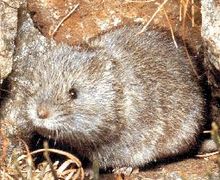
|
| Balkan snow vole (Dinarska voluharica) | Dinaromys bogdanovi | S Raška | VU | |
| Field vole | Microtus agrestis | NW Vojvodina | LC | 
|
| Common vole (Poljska voluharica) | Microtus arvalis | Throughout Serbia | LC | 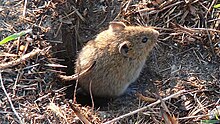
|
| Balkan pine vole | Microtus felteni | S Serbia | DD | |
| Günther's vole | Microtus guentheri | S Serbia | LC | 
|
| Southern vole | Microtus levis | W Pčinja | LC | |
| Liechtenstein's pine vole | Microtus liechtensteini | W Serbia | LC | |
| European pine vole | Microtus subterraneus | Throughout Serbia | LC | 
|
| Bank vole (Šumska voluharica) | Myodes glareolus | W and S Serbia | LC | 
|
| Family: Dipodidae | ||||
| Southern birch mouse | Sicista subtilis | Jasenovo | LC | 
|
| Family Gliridae | ||||
| Forest dormouse | Dryomys nitedula | Throughout Serbia | LC | 
|
| European edible dormouse (Obični puh) | Glis glis | Throughout Serbia | LC | 
|
| Hazel dormouse (Puh orašar) | Muscardinus avellanarius | Throughout Serbia | LC | 
|
| Family: Muridae | ||||
| Striped field mouse (Poljski miš) | Apodemus agrarius | Throughout Serbia | LC | 
|
| Western broad-toothed field mouse | Apodemus epimelas | S Pčinja | LC | |
| Yellow-necked field mouse (Žutogrli miš) | Apodemus flavicollis | Throughout Serbia | LC | 
|
| Long-tailed field mouse (Šumski miš) | Apodemus sylvaticus | Throughout Serbia | LC | 
|
| Herb field mouse | Apodemus uralensis | NE Bor | LC | 
|
| Eurasian harvest mouse (Patuljasti miš) | Micromys minutus | Throughout Serbia | LC | 
|
| Macedonian mouse (Makedonski miš) | Mus macedonicus | S Pčinja | LC | |
| House mouse (Kućni miš) | Mus musculus | Throughout Serbia | LC | 
|
| Steppe mouse | Mus spicilegus | N and E Serbia | LC | |
| Black rat | Rattus rattus | (Introduced)
Throughout Serbia |
LC | 
|
| Brown rat | Rattus norvegicus | (Introduced)
Throughout Serbia |
LC | 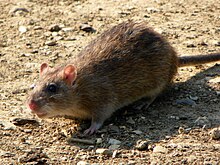
|
| Family: Sciuridae | ||||
| Red squirrel (Evropska veverica) | Sciurus vulgaris | Throughout Serbia | LC | 
|
| European ground squirrel (Tekunica) | Spermophilus citellus | N Serbia | VU | 
|
| Family: Spalacidae | ||||
| Lesser mole-rat (Slepo kuče) | Spalax leucodon | Throughout Serbia | DD | 
|
Order: Lagomorpha
There is one species of lagomorph in Serbia.
| Common name | Scientific name | Range | IUCN status | Photo |
|---|---|---|---|---|
| Family: Leporidae | ||||
| European hare
(Evropski zec) |
Lepus europaeus | Throughout Serbia | LC | 
|
Order: Eulipotyphla
There are ten species of eulipotyph in Serbia. One species is near threatened.
| Common name (Serbian name) | Scientific name | Range | IUCN status | Photo |
|---|---|---|---|---|
| Family: Erinaceidae | ||||
| Northern white-breasted hedgehog
(Severni beloprsi jež) |
Erinaceus roumanicus | Throughout Serbia | LC | 
|
| Family: Soricidae | ||||
| Bicolored shrew | Crocidura leucodon | Throughout Serbia | LC | 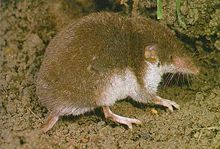
|
| Lesser white-toothed shrew | Crocidura suaveolens | Throughout Serbia | LC | 
|
| Mediterranean water shrew | Neomys anomalus | Throughout Serbia | LC | 
|
| Eurasian water shrew | Neomys fodiens | Throughout Serbia | LC | |
| Alpine shrew | Sorex alpinus | W Serbia | NT | 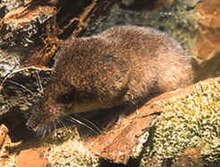
|
| Eurasian shrew | Sorex araneus | Throughout Serbia | LC | 
|
| Eurasian pygmy shrew | Sorex minutus | Throughout Serbia | LC | 
|
| Family: Talpidae | ||||
| Blind mole | Talpa caeca | W Serbia | LC | |
| European mole
(Evropska krtica) |
Talpa europaea | Throughout Serbia | LC | 
|
Order: Chiroptera
There are thirty-one species of bat in Serbia. Two species are vulnerable and five species are near threatened.
| Common name | Scientific name | Range | IUCN status | Photo |
|---|---|---|---|---|
| Family: Miniopteridae | ||||
| Common bent-wing bat | Miniopterus schreibersii | Throughout Serbia | VU | |
| Family: Molossidae | ||||
| European free-tailed bat | Tadarida teniotis | S Serbia | LC | 
|
| Family: Rhinolophidae | ||||
| Blasius's horseshoe bat | Rhinolophus blasii | SE Serbia | LC | |
| Mediterranean horseshoe bat | Rhinolophus euryale | C and S Serbia | NT | |
| Greater horseshoe bat (Veliki potkovnjak) | Rhinolophus ferrumequinum | Throughout Serbia | LC | 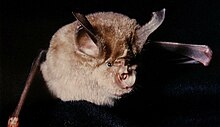
|
| Lesser horseshoe bat (Mali potkovnjak) | Rhinolophus hipposideros | Throughout Serbia | LC | 
|
| Mehely's horseshoe bat | Rhinolophus mehelyi | Boljevac | VU | 
|
| Family: Vespertilionidae | ||||
| Western barbastelle | Barbastella barbastellus | N Serbia | NT | 
|
| Serotine bat | Eptesicus serotinus | Throughout Serbia | LC | 
|
| Alcathoe whiskered bat | Myotis alcathoe | Throughout Serbia
(probably) |
DD | 
|
| Steppe whiskered bat | Myotis aurascens | Pčinja | LC | |
| Bechstein's bat | Myotis bechsteinii | N Serbia | NT | 
|
| Lesser mouse-eared bat | Myotis blythii | Throughout Serbia | LC | 
|
| Brandt's bat | Myotis brandtii | Throughout Serbia | LC | 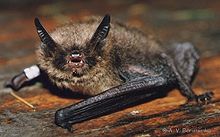
|
| Long-fingered bat | Myotis capaccinii | S Serbia | VU | 
|
| Pond bat | Myotis dasycneme | NE Serbia | NT | 
|
| Daubenton's bat | Myotis daubentonii | N, E and S Serbia | LC | 
|
| Geoffroy's bat | Myotis emarginatus | Throughout Serbia | LC | |
| Greater mouse-eared bat | Myotis myotis | Throughout Serbia | LC | 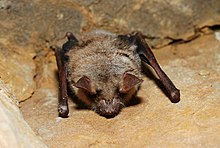
|
| Whiskered bat | Myotis mystacinus | Throughout Serbia | LC | 
|
| Natterer's bat | Myotis nattereri | Throughout Serbia | LC | 
|
| Lesser noctule
(Mali noćnik) |
Nyctalus leisleri | Throughout Serbia | LC | 
|
| Common noctule | Nyctalus noctula | Throughout Serbia | LC | 
|
| Kuhl's pipistrelle | Pipistrellus kuhlii | Throughout Serbia | LC | 
|
| Nathusius's pipistrelle | Pipistrellus nathusii | Throughout Serbia | LC | 
|
| Common pipistrelle | Pipistrellus pipistrellus | Throughout Serbia | LC | 
|
| Pygmy pipistrelle | Pipistrellus pygameus | N Vojvodina | LC | 
|
| Savi's pipistrelle | Hypsugo savii | Belgrade and S Serbia | LC | |
| Brown big-eared bat | Plecotus auritus | Throughout Serbia | LC | 
|
| Grey long-eared bat | Plecotus austriacus | Throughout Serbia | NT | 
|
| Parti-coloured bat | Vespertilio murinus | Throughout Serbia | LC | |
Order: Carnivora
There are fourteen species of carnivore in Serbia. One species is vulnerable and one species is near threatened.
| Common name (Serbian name) | Scientific name | Range | IUCN status | Photo |
|---|---|---|---|---|
| Family: Canidae | ||||
| Golden jackal
(Zlatni šakal) |
Canis aureus | Throughout Serbia | LC | 
|
| Grey wolf
(Sivi vuk) |
Canis lupus | SW to E Serbia | LC | 
|
| Red fox
(Riđa lisica) |
Vulpes vulpes | Throughout Serbia | LC | 
|
| Family: Felidae | ||||
| European wildcat
(Divlja mačka) |
Felis silvestris | Throughout Serbia | LC | 
|
| Eurasian lynx
(Obični ris) |
Lynx lynx | E Serbia | LC | 
|
| Family: Mustelidae | ||||
| European otter
(Evroazijska vidra) |
Lutra lutra | Throughout Serbia | NT | 
|
| Beech marten
(Kuna belica) |
Martes foina | Throughout Serbia | LC | 
|
| European pine marten
(Kuna zlatica) |
Martes martes | Throughout Serbia | LC | 
|
| European badger
(Jazavac) |
Meles meles | Throughout Serbia | LC | 
|
| Stoat
(Velika lasica) |
Mustela erminea | N Serbia | LC | 
|
| Steppe polecat
(Stepeni tvor) |
Mustela eversmanii | NE and E Serbia | LC | 
|
| Least weasel | Mustela nivalis | Throughout Serbia | LC | 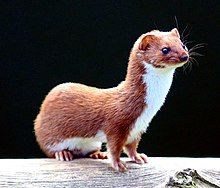
|
| European polecat
(Tvor) |
Mustela putorius | Throughout Serbia | LC | 
|
| American mink | Neogale vison | Introduced | LC | 
|
| Marbled polecat | Vormela peregusna | SE and E Serbia | VU | 
|
| Family: Ursidae | ||||
| Eurasian brown bear
(Mrki medved) |
Ursus arctos arctos | W Serbia | LC | 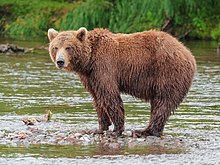
|
Order: Artiodactyla
There are five species of even-toed ungulate in Serbia.
| Common name | Scientific name | Range | IUCN status | Photo |
|---|---|---|---|---|
| Family: Bovidae | ||||
| Chamois
(Divokoza) |
Rupicapra rupicapra | Đerdap National Park, Brestovac, Grobnice | LC | 
|
| Family: Cervidae | ||||
| Roe deer
(Srna) |
Capreolus capreolus | Throughout Serbia | LC | 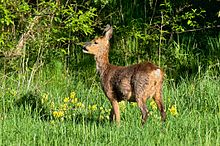
|
| Red deer
(Crveni jelen) |
Cervus elaphus | N and E Serbia | LC | 
|
| European fallow deer
(Jelen lopatar) |
Dama dama | Throughout Serbia | LC | 
|
| Family: Suidae | ||||
| Wild boar
(Divlja svinja) |
Sus scrofa | Throughout Serbia | LC | 
|
Locally extinct
The following species are locally extinct in the country:
- European bison, Bison bonasus
- European mink, Mustela lutreola
See also
References
- Batbold, J.; Batsaikhan, N.; Shar, S.; Hutterer, R.; Kryštufek, B.; Yigit, N.; Mitsain, G.; Palomo, L. (2016). "Castor fiber". IUCN Red List of Threatened Species. 2016: e.T4007A115067136.
- Batsaikhan, N.; Henttonen, H.; Meinig, H.; Shenbrot, G.; Bukhnikashvili, A.; Hutterer, R.; Kryštufek, B.; Yigit, N.; Mitsain, G. & Palomo, L. (2016). "Arvicola amphibius". IUCN Red List of Threatened Species. 2016: e.T2149A115060819. doi:10.2305/IUCN.UK.2016-3.RLTS.T2149A115060819.en.
- Amori, G.; Hutterer, R.; Kryštufek, B.; Yigit, N.; Mitsain, G.; Muñoz, L. J. P. (2010). "Sciurus vulgaris". IUCN Red List of Threatened Species. 2010: e.T20025A9136220.
- Hacklande, K.; Schai-Braun, S. (2019). "Lepus europaeus". IUCN Red List of Threatened Species. 2019: e.T41280A45187424. doi:10.2305/IUCN.UK.2019-1.RLTS.T41280A45187424.en.
- Hutterer, R.; Amori, G.; Krystufek, B.; Yigit, N.; Mitsain, G. & Palomo, L.J. (2010). "Crocidura suaveolens". IUCN Red List of Threatened Species. 2010: e.T29656A9511068.
- Gazaryan, S.; Bücs, S. & Çoraman, E. (2021) . "Miniopterus schreibersii". IUCN Red List of Threatened Species. 2020: e.T81633057A19585652.
- Piraccini, R. (2016). "Barbastella barbastellus". IUCN Red List of Threatened Species. 2016: e.T2553A22029285.
- Paunović, M. (2019). "Myotis bechsteinii". IUCN Red List of Threatened Species. 2019: e.T14123A22053752. doi:10.2305/IUCN.UK.2016-2.RLTS.T14123A22053752.en.{{cite iucn}}: |volume= / |doi= mismatch, |date= / |doi= mismatch (help)
- Juste, J. & Paunović, M. (2016). "Myotis blythii". IUCN Red List of Threatened Species. 2016: e.T14124A22053297. doi:10.2305/IUCN.UK.2016-2.RLTS.T14124A22053297.en.
- Hutson, A. M.; Spitzenberger, F.; Aulagnier, S.; Juste, J.; Karatas, A.; Palmeirim, J. & Paunovic, M. (2010). "Myotis capaccinii". IUCN Red List of Threatened Species. 2010: e.T14126A4399043.
- Piraccini, R. (2016). "Myotis dasycneme". IUCN Red List of Threatened Species. 2016: e.T14127A22055164. doi:10.2305/IUCN.UK.2016-2.RLTS.T14127A22055164.en.
- Csorba, G. & Hutson, A.M. (2016). "Nyctalus noctula". IUCN Red List of Threatened Species. 2016: e.T14920A22015682. doi:10.2305/IUCN.UK.2016-2.RLTS.T14920A22015682.en.
- Hutson, A. M.; Spitzenberger, F.; Juste, J.; Aulagnier, S.; Palmeirim, J.; Karatas, A. & Paunovic, M. (2010). "Pipistrellus nathusii". IUCN Red List of Threatened Species. 2010: e.T17316A6966886.
- Hutson, A. M.; Spitzenberger, F.; Juste, J.; Aulagnier, S.; Palmeirim, J.; Paunovic, M.; Karatas, A. (2010). "Hypsugo savii". IUCN Red List of Threatened Species. 2010: e.T44856A10955205.
- Gazaryan, S. & Godlevska, L. (2020) . "Plecotus austriacus". IUCN Red List of Threatened Species. 2020: e.T85533333A195862345.
- Boitani, L.; Phillips, M. & Jhala, Y. (2018). "Canis lupus". IUCN Red List of Threatened Species. 2018: e.T3746A119623865. doi:10.2305/IUCN.UK.2018-2.RLTS.T3746A119623865.en.
- Hoffmann, M.; Sillero-Zubiri, C. (2016). "Vulpes vulpes". IUCN Red List of Threatened Species. 2016: e.T23062A46190249. doi:10.2305/IUCN.UK.2016-1.RLTS.T23062A46190249.en.
- Gerngross, P.; Ambarli, H.; Angelici, F.M.; Anile, S.; Campbell, R.; Ferreras de Andres, P.; Gil-Sanchez, J.M.; Götz, M.; Jerosch, S.; Mengüllüoglu, D.; Monterosso, P. & Zlatanova, D. (2022). "Felis silvestris". IUCN Red List of Threatened Species. 2022: e.T181049859A181050999. doi:10.2305/IUCN.UK.2022-1.RLTS.T181049859A181050999.en. Retrieved 3 August 2022.
- Breitenmoser, U.; Breitenmoser-Würsten, C.; Lanz, T.; von Arx, M.; Antonevich, A.; Bao, W. & Avgan, B. (2015). "Lynx lynx". IUCN Red List of Threatened Species. 2015: e.T12519A121707666.
- Roos, A.; Loy, A.; de Silva, P.; Hajkova, P.; Zemanová, B. (2015). "Lutra lutra". IUCN Red List of Threatened Species. 2015: e.T12419A21935287. doi:10.2305/IUCN.UK.2015-2.RLTS.T12419A21935287.en.
- Kranz, A.; Abramov, A. V.; Herrero, J. & Maran, T. (2016). "Meles meles". IUCN Red List of Threatened Species. 2016: e.T29673A45203002.
- Reid, F.; Schiaffini, M. & Schipper, J. (2016). "Neovison vison". IUCN Red List of Threatened Species. 2016: e.T41661A45214988.
- McLellan, B. N.; Proctor, M. F.; Huber, D. & Michel, S. (2017). "Ursus arctos". IUCN Red List of Threatened Species. 2017: e.T41688A121229971.
- Masseti, M.; Mertzanidou, D. (2008). "Dama dama". IUCN Red List of Threatened Species. 2008: e.T42188A10656554. doi:10.2305/IUCN.UK.2008.RLTS.T42188A10656554.en.
- Plumb, G.; Kowalczyk, R. & Hernandez-Blanco, J.A. (2020). "Bison bonasus". IUCN Red List of Threatened Species. 2020: e.T2814A45156279.
- Maran, T.; Aulagnier, S.; Libois, R.; Kranz, A.; Abramov, A. & Wozencraft, C. (2010). "Mustela lutreola". IUCN Red List of Threatened Species. 2010: e.T14018A4381596.
| List of mammals of Europe | |
|---|---|
| Sovereign states |
|
| States with limited recognition | |
| Dependencies and other entities | |